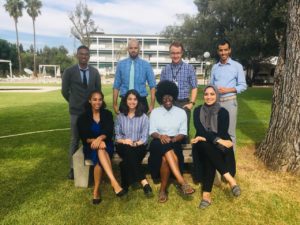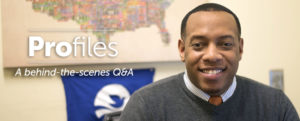UMW Goes Global as Peace Corps Top Producer
Teenage boys can be a handful, no matter which country or culture they come from.

Amal Hajjami (front row, far right), who graduated from UMW in 2019, is among the dozen Mary Washington alumni currently serving in the Peace Corps. The University was just named a Peace Corps Top Producer.
Amal Hajjami learned that fact within her first few weeks of Peace Corps training in Morocco, when the 2019 alumna encountered a young man who refused to participate or follow the rules – when he even bothered to show up – but she wouldn’t give up on him.
“During training, we’re taught that we shouldn’t push these individuals away,” she said, “but instead, give them leadership responsibilities.” Soon the teen was stepping up and helping out. “He showed me that once you start encouraging people, the outcome will change.”
Hajjami is among a dozen Mary Washington graduates serving worldwide in the Peace Corps, to which the University of Mary Washington has once again been named a top contributor. UMW jumped to number seven – up from 15th last year – among small schools on the 2020 Top Volunteer-Producing Schools list, released this morning.
Securing this prestigious ranking is a longstanding tradition for the University, which has earned a spot on the list since 2005. For 12 consecutive years, UMW has been included among the top 25 colleges and universities with fewer than 5,000 students. A total of 270 alumni have joined the Peace Corps since its 1961 inception.
“Mary Washington’s culture of service keeps fueling students’ interest in continuing their commitment to populations served by the Peace Corps,” said José A. Sainz, director of UMW’s Center for International Education (CIE). “It pushes their boundaries and offers many opportunities for them to become better global citizens.” Read more.
